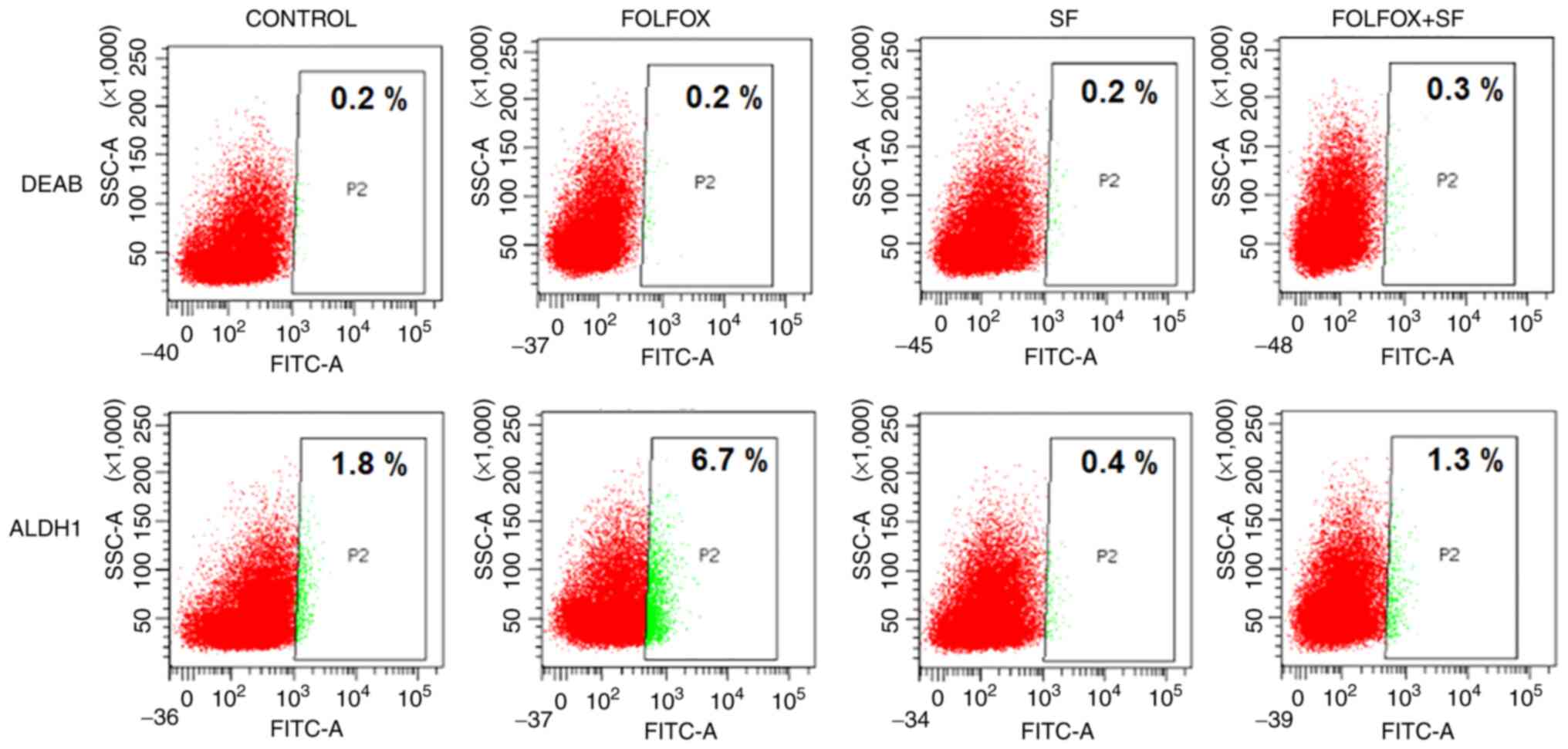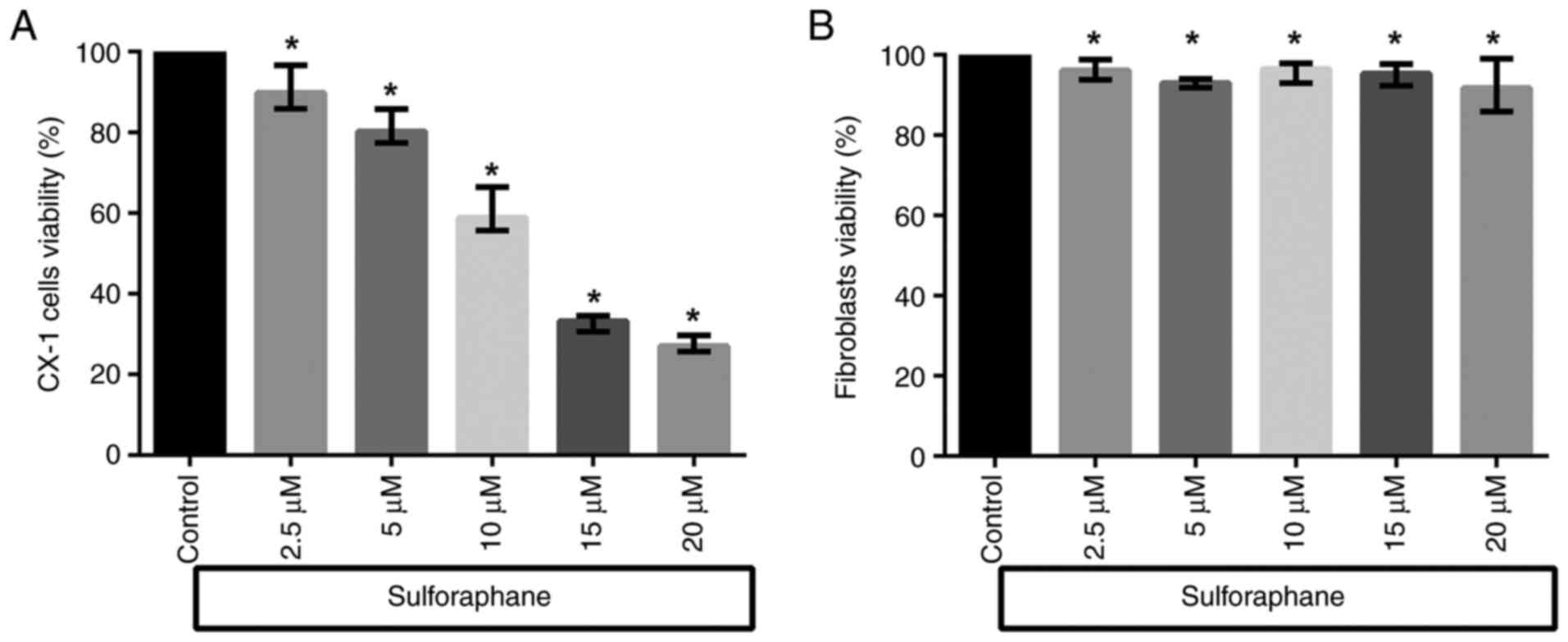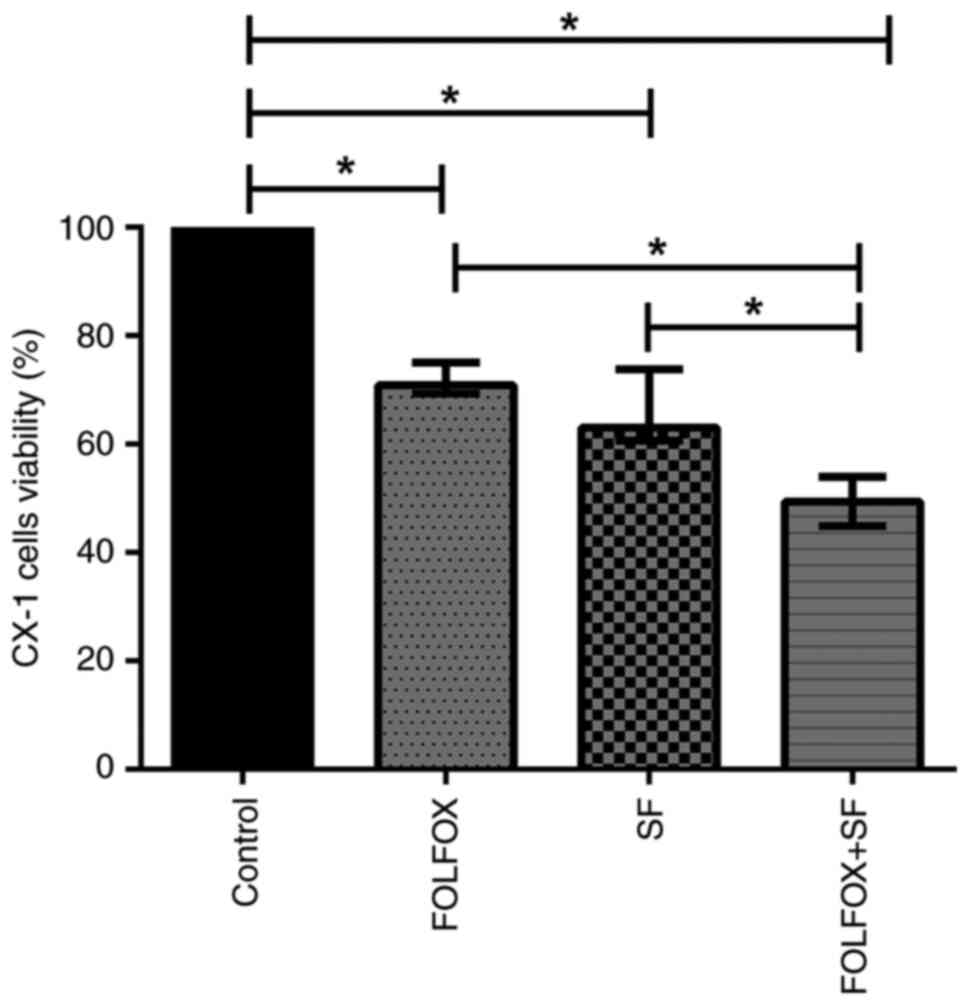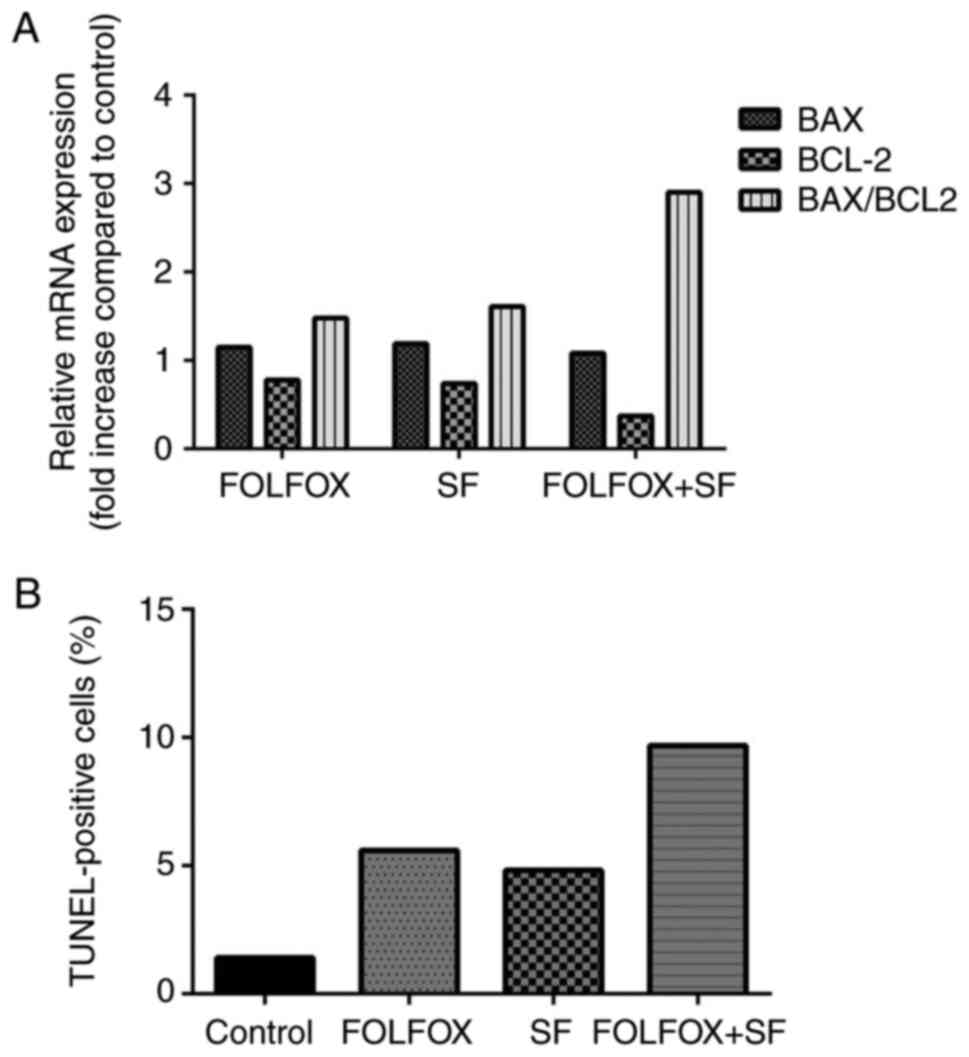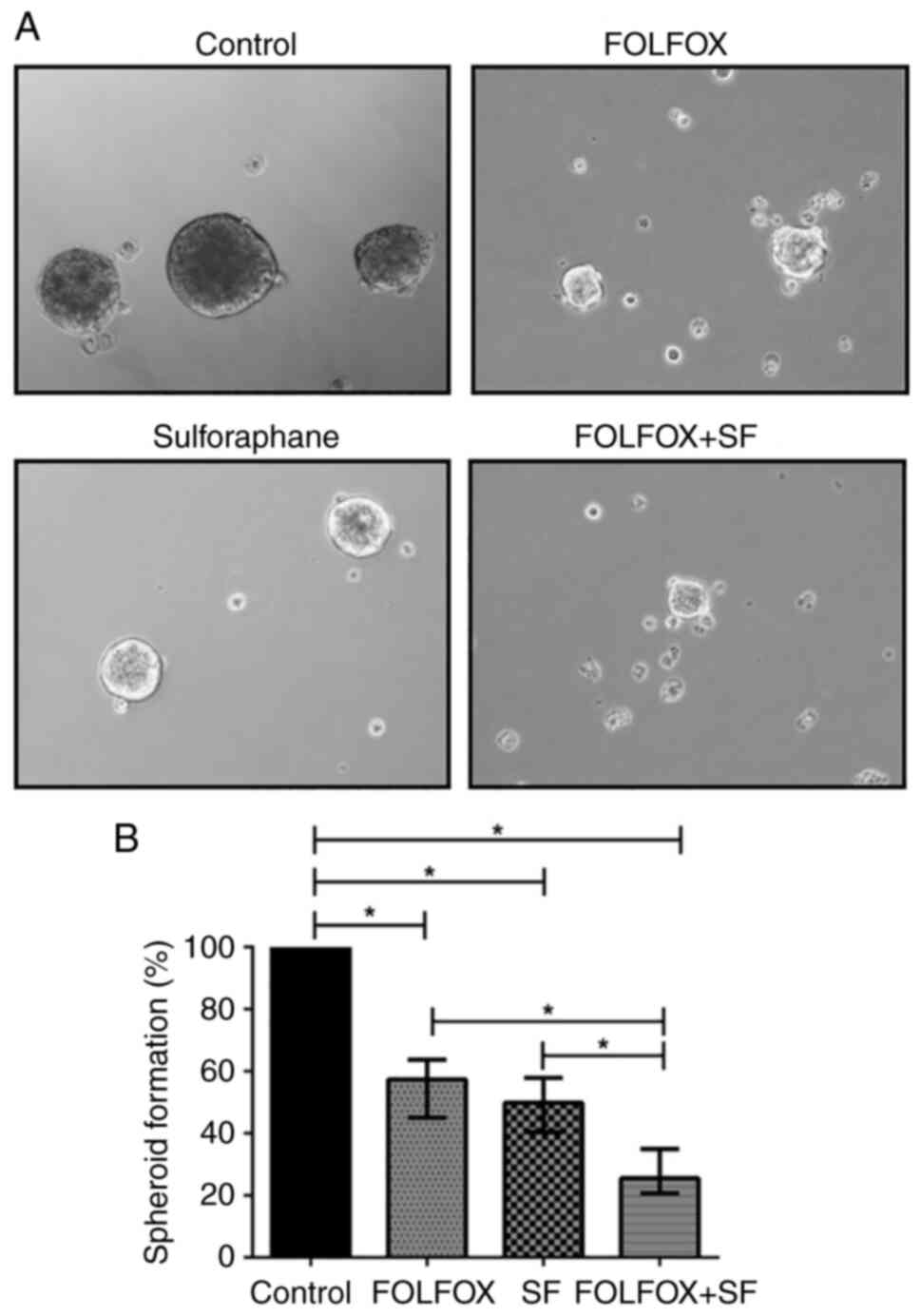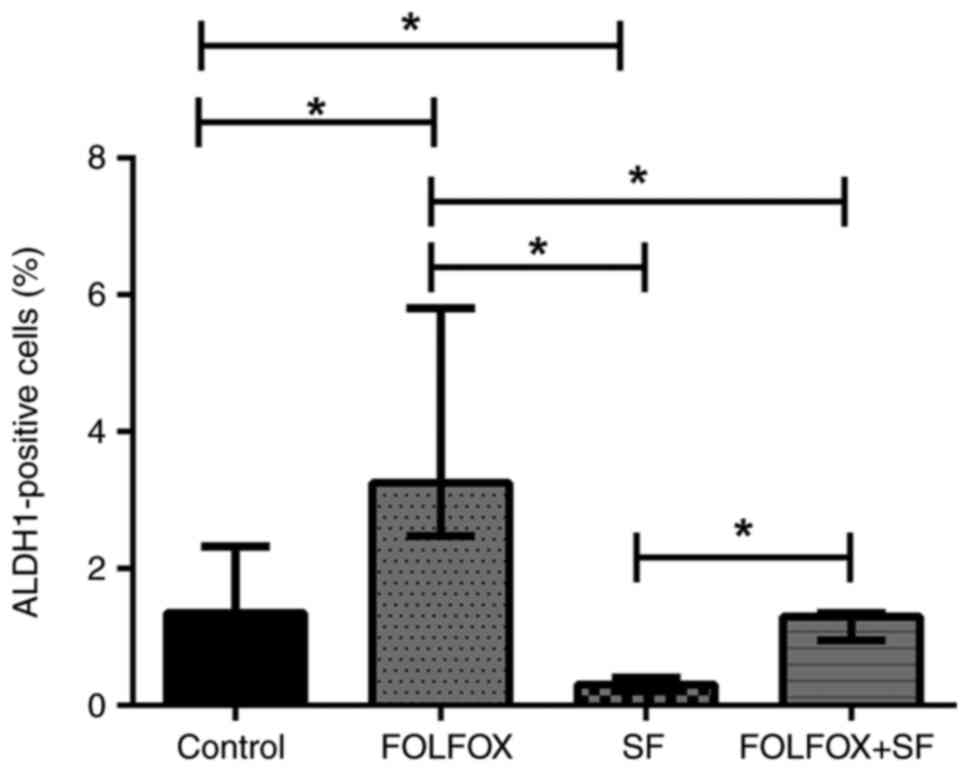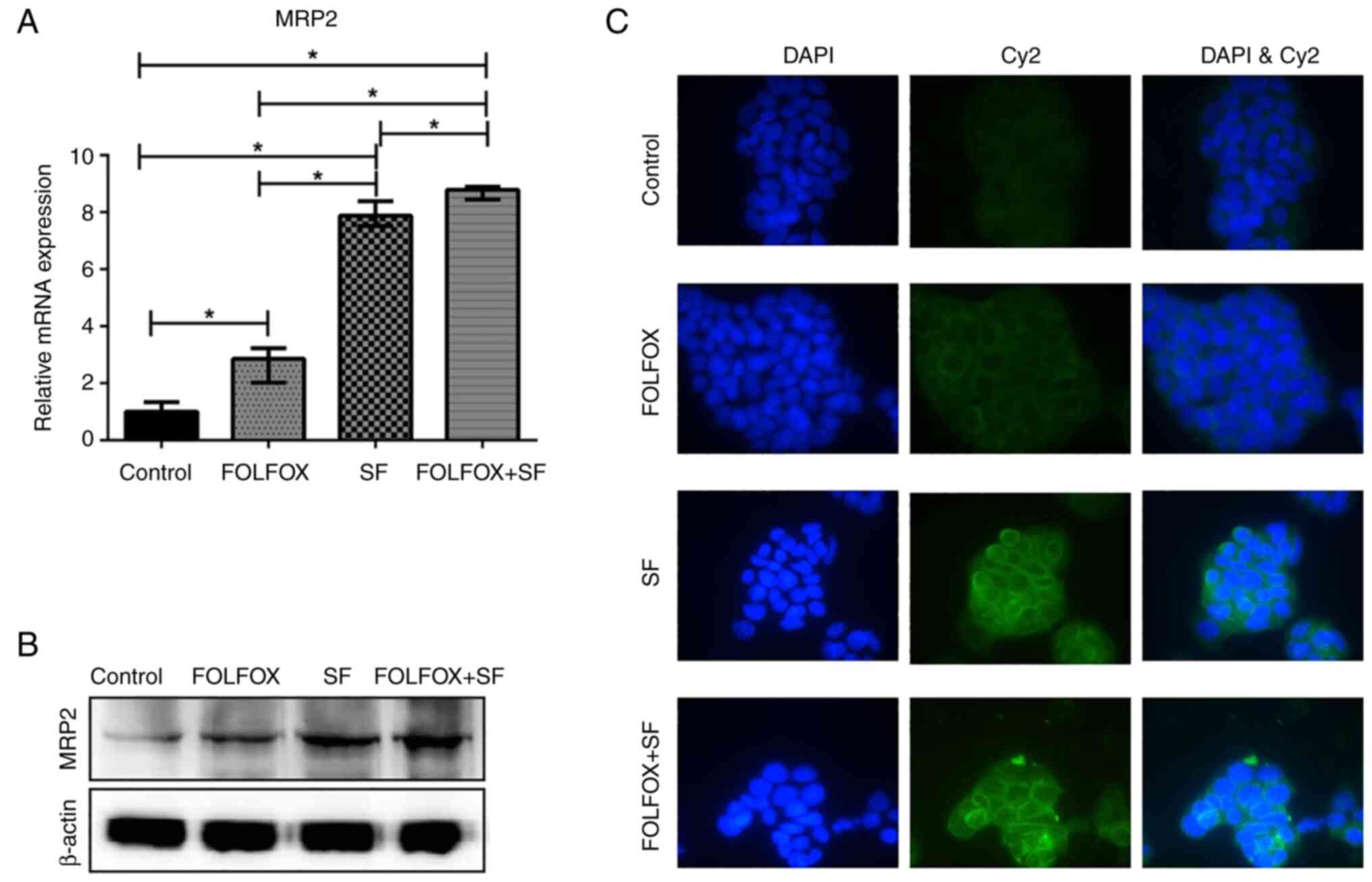|
1
|
Sung H, Ferlay J, Siegel RL, Laversanne M,
Soerjomataram I, Jemal A and Bray F: Global cancer statistics 2020:
GLOBOCAN estimates of incidence and mortality worldwide for 36
cancers in 185 countries. CA Cancer J Clin. 71:209–249. 2021.
View Article : Google Scholar : PubMed/NCBI
|
|
2
|
Nakayama G, Tanaka C and Kodera Y: Current
options for the diagnosis, staging and therapeutic management of
colorectal cancer. Gastrointest Tumors. 1:25–32. 2014. View Article : Google Scholar : PubMed/NCBI
|
|
3
|
Taghizadeh H and Prager GW: Personalized
adjuvant treatment of colon cancer. Visc Med. 36:397–406. 2020.
View Article : Google Scholar : PubMed/NCBI
|
|
4
|
Chibaudel B, Tournigand C, André T and de
Gramont A: Therapeutic strategy in unresectable metastatic
colorectal cancer. Ther Adv Med Oncol. 4:75–89. 2012. View Article : Google Scholar : PubMed/NCBI
|
|
5
|
Bahadoer RR, Dijkstra EA, van Etten B,
Marijnen CAM, Putter H, Kranenbarg EM, Roodvoets AGH, Nagtegaal ID,
Beets-Tan RGH, Blomqvist LK, et al: Short-course radiotherapy
followed by chemotherapy before total mesorectal excision (TME)
versus preoperative chemoradiotherapy, TME, and optional adjuvant
chemotherapy in locally advanced rectal cancer (RAPIDO): A
randomised, open-label, phase 3 trial. Lancet Oncol. 22:29–42.
2021. View Article : Google Scholar : PubMed/NCBI
|
|
6
|
Conroy T, Bosset JF, Etienne PL, Rio E,
François É, Mesgouez-Nebout N, Vendrely V, Artignan X, Bouché O,
Gargot D, et al: Neoadjuvant chemotherapy with FOLFIRINOX and
preoperative chemoradiotherapy for patients with locally advanced
rectal cancer (UNICANCER-PRODIGE 23): A multicentre, randomised,
open-label, phase 3 trial. Lancet Oncol. 22:702–715. 2021.
View Article : Google Scholar : PubMed/NCBI
|
|
7
|
Roth MT and Eng C: Neoadjuvant
chemotherapy for colon cancer. Cancers. 12:23682020. View Article : Google Scholar
|
|
8
|
Maneikyte J, Bausys A, Leber B, Horvath A,
Feldbacher N, Hoefler G, Strupas K, Stiegler P and Schemmer P:
Dietary glycine decreases both tumor volume and vascularization in
a combined colorectal liver metastasis and chemotherapy model. Int
J Biol Sci. 15:1582–1590. 2019. View Article : Google Scholar : PubMed/NCBI
|
|
9
|
Ge M, Zhang L, Cao L, Xie C, Li X, Li Y,
Meng Y, Chen Y, Wang X, Chen J, et al: Sulforaphane inhibits
gastric cancer stem cells via suppressing sonic hedgehog pathway.
Int J Food Sci Nutr. 70:570–578. 2019. View Article : Google Scholar : PubMed/NCBI
|
|
10
|
Kim JK and Park SU: Current potential
health benefits of sulforaphane. EXCLI J. 15:571–577.
2016.PubMed/NCBI
|
|
11
|
Mielczarek L, Krug P, Mazur M, Milczarek
M, Chilmonczyk Z and Wiktorska K: In the triple-negative breast
cancer MDA-MB-231 cell line, sulforaphane enhances the
intracellular accumulation and anticancer action of doxorubicin
encapsulated in liposomes. Int J Pharm. 558:311–318. 2019.
View Article : Google Scholar : PubMed/NCBI
|
|
12
|
Hać A, Brokowska J, Rintz E, Bartkowski M,
Węgrzyn G and Herman-Antosiewicz A: Mechanism of selective
anticancer activity of isothiocyanates relies on differences in DNA
damage repair between cancer and healthy cells. Eur J Nutr.
59:1421–1432. 2020. View Article : Google Scholar : PubMed/NCBI
|
|
13
|
Xia Y, Kang TW, Jung YD, Zhang C and Lian
S: Sulforaphane inhibits nonmuscle invasive bladder cancer cells
proliferation through suppression of HIF-1α-mediated glycolysis in
hypoxia. J Agric Food Chem. 67:7844–7854. 2019. View Article : Google Scholar : PubMed/NCBI
|
|
14
|
Wang Y, Wu H, Dong N, Su X, Duan M, Wei Y,
Wei J, Liu G, Peng Q and Zhao Y: Sulforaphane induces S-phase
arrest and apoptosis via p53-dependent manner in gastric cancer
cells. Sci Rep. 11:25042021. View Article : Google Scholar : PubMed/NCBI
|
|
15
|
Harris KE and Jeffery EH: Sulforaphane and
erucin increase MRP1 and MRP2 in human carcinoma cell lines. J Nutr
Biochem. 19:246–254. 2008. View Article : Google Scholar : PubMed/NCBI
|
|
16
|
Petrick AT, Meterissian S, Steele G and
Thomas P: Desialylation of metastatic human colorectal carcinoma
cells facilitates binding to Kupffer cells. Clin Exp Metastasis.
12:108–116. 1994. View Article : Google Scholar : PubMed/NCBI
|
|
17
|
Bruns H, Petrulionis M, Schultze D, Al
Saeedi M, Lin S, Yamanaka K, Ambrazevičius M, Strupas K and
Schemmer P: Glycine inhibits angiogenic signaling in human
hepatocellular carcinoma cells. Amino Acids. 46:969–976. 2014.
View Article : Google Scholar : PubMed/NCBI
|
|
18
|
Livak KJ and Schmittgen TD: Analysis of
relative gene expression data using real-time quantitative PCR and
the 2(−Delta Delta C(T)) method. Methods. 25:402–408. 2001.
View Article : Google Scholar : PubMed/NCBI
|
|
19
|
Goldberg RM, Sargent DJ, Morton RF, Fuchs
CS, Ramanathan RK, Williamson SK, Findlay BP, Pitot HC and Alberts
SR: A randomized controlled trial of fluorouracil plus leucovorin,
irinotecan, and oxaliplatin combinations in patients with
previously untreated metastatic colorectal cancer. J Clin Oncol.
22:23–30. 2004. View Article : Google Scholar : PubMed/NCBI
|
|
20
|
de Gramont A, Figer A, Seymour M, Homerin
M, Hmissi A, Cassidy J, Boni C, Cortes-Funes H, Cervantes A, Freyer
G, et al: Leucovorin and fluorouracil with or without oxaliplatin
as first-line treatment in advanced colorectal cancer. J Clin
Oncol. 18:2938–2947. 2000. View Article : Google Scholar : PubMed/NCBI
|
|
21
|
Mikalauskas S, Mikalauskiene L, Bruns H,
Nickkholgh A, Hoffmann K, Longerich T, Strupas K, Büchler MW and
Schemmer P: Dietary glycine protects from chemotherapy-induced
hepatotoxicity. Amino Acids. 40:1139–1150. 2011. View Article : Google Scholar : PubMed/NCBI
|
|
22
|
Maneikyte J, Bausys A, Leber B, Feldbacher
N, Hoefler G, Kolb-Lenz D, Strupas K, Stiegler P and Schemmer P:
Dietary glycine prevents FOLFOX chemotherapy-induced heart injury:
A colorectal cancer liver metastasis treatment model in rats.
Nutrients. 12:26342020. View Article : Google Scholar : PubMed/NCBI
|
|
23
|
Petrioli R, Pascucci A, Francini E,
Marsili S, Sciandivasci A, Tassi R, Civitelli S, Tanzini G, Lorenzi
M and Francini G: Neurotoxicity of FOLFOX-4 as adjuvant treatment
for patients with colon and gastric cancer: A randomized study of
two different schedules of oxaliplatin. Cancer Chemother Pharmacol.
61:105–111. 2008. View Article : Google Scholar : PubMed/NCBI
|
|
24
|
Filewod N and Lipman ML: Severe acute
tubular necrosis observed subsequent to oxaliplatin administration.
Clin Kidney J. 7:68–70. 2014. View Article : Google Scholar : PubMed/NCBI
|
|
25
|
Goldberg RM, Tabah-Fisch I, Bleiberg H, de
Gramont A, Tournigand C, Andre T, Rothenberg ML, Green E and
Sargent DJ: Pooled analysis of safety and efficacy of oxaliplatin
plus fluorouracil/leucovorin administered bimonthly in elderly
patients with colorectal cancer. J Clin Oncol. 24:4085–4091. 2006.
View Article : Google Scholar : PubMed/NCBI
|
|
26
|
Chun YS, Laurent A, Maru D and Vauthey JN:
Management of chemotherapy-associated hepatotoxicity in colorectal
liver metastases. Lancet Oncol. 10:278–286. 2009. View Article : Google Scholar : PubMed/NCBI
|
|
27
|
Lozanovski VJ, Houben P, Hinz U, Hackert
T, Herr I and Schemmer P: Pilot study evaluating broccoli sprouts
in advanced pancreatic cancer (POUDER trial)-study protocol for a
randomized controlled trial. Trials. 15:2042014. View Article : Google Scholar : PubMed/NCBI
|
|
28
|
Lozanovski VJ, Polychronidis G, Gross W,
Gharabaghi N, Mehrabi A, Hackert T, Schemmer P and Herr I: Broccoli
sprout supplementation in patients with advanced pancreatic cancer
is difficult despite positive effects-results from the POUDER pilot
study. Invest New Drugs. 38:776–784. 2020. View Article : Google Scholar : PubMed/NCBI
|
|
29
|
Kaminski BM, Weigert A, Brüne B,
Schumacher M, Wenzel U, Steinhilber D, Stein J and Ulrich S:
Sulforaphane potentiates oxaliplatin-induced cell growth inhibition
in colorectal cancer cells via induction of different modes of cell
death. Cancer Chemother Pharmacol. 67:1167–1178. 2011. View Article : Google Scholar : PubMed/NCBI
|
|
30
|
Wang XF, Wu DM, Li BX, Lu YJ and Yang BF:
Synergistic inhibitory effect of sulforaphane and 5-fluorouracil in
high and low metastasis cell lines of salivary gland adenoid cystic
carcinoma. Phytother Res PTR. 23:303–307. 2009. View Article : Google Scholar : PubMed/NCBI
|
|
31
|
Gupta P, Kim B, Kim SH and Srivastava SK:
Molecular targets of isothiocyanates in cancer: Recent advances.
Mol Nutr Food Res. 58:1685–1707. 2014. View Article : Google Scholar : PubMed/NCBI
|
|
32
|
Fu Y, Yang G, Zhu F, Peng C, Li W, Li H,
Kim HG, Bode AM and Dong Z and Dong Z: Antioxidants decrease the
apoptotic effect of 5-Fu in colon cancer by regulating
Src-dependent caspase-7 phosphorylation. Cell Death Dis. 5:e983.
2014. View Article : Google Scholar : PubMed/NCBI
|
|
33
|
Bausys A, Maneikyte J, Leber B, Weber J,
Feldbacher N, Strupas K, Dschietzig TB, Schemmer P and Stiegler P:
Custodiol® supplemented with synthetic human relaxin
decreases ischemia-reperfusion injury after porcine kidney
transplantation. Int J Mol Sci. 22:114172021. View Article : Google Scholar : PubMed/NCBI
|
|
34
|
Borner C: The Bcl-2 protein family:
Sensors and checkpoints for life-or-death decisions. Mol Immunol.
39:615–647. 2003. View Article : Google Scholar : PubMed/NCBI
|
|
35
|
Xu X, Liu Y, Wang L, He J, Zhang H, Chen
X, Li Y, Yang J and Tao J: Gambogic acid induces apoptosis by
regulating the expression of Bax and Bcl-2 and enhancing caspase-3
activity in human malignant melanoma A375 cells. Int J Dermatol.
48:186–192. 2009. View Article : Google Scholar : PubMed/NCBI
|
|
36
|
Khodapasand E, Jafarzadeh N, Farrokhi F,
Kamalidehghan B and Houshmand M: Is Bax/Bcl-2 ratio considered as a
prognostic marker with age and tumor location in colorectal cancer?
Iran Biomed J. 19:69–75. 2015.PubMed/NCBI
|
|
37
|
Edmondson R, Broglie JJ, Adcock AF and
Yang L: Three-dimensional cell culture systems and their
applications in drug discovery and cell-based biosensors. Assay
Drug Dev Technol. 12:207–218. 2014. View Article : Google Scholar : PubMed/NCBI
|
|
38
|
Okochi M, Takano S, Isaji Y, Senga T,
Hamaguchi M and Honda H: Three-dimensional cell culture array using
magnetic force-based cell patterning for analysis of invasive
capacity of BALB/3T3/v-src. Lab Chip. 9:3378–3384. 2009. View Article : Google Scholar : PubMed/NCBI
|
|
39
|
Kallifatidis G, Rausch V, Baumann B, Apel
A, Beckermann BM, Groth A, Mattern J, Li Z, Kolb A, Moldenhauer G,
et al: Sulforaphane targets pancreatic tumour-initiating cells by
NF-kappaB-induced antiapoptotic signalling. Gut. 58:949–963. 2009.
View Article : Google Scholar : PubMed/NCBI
|
|
40
|
Li Y, Wicha MS, Schwartz SJ and Sun D:
Implications of cancer stem cell theory for cancer chemoprevention
by natural dietary compounds. J Nutr Biochem. 22:799–806. 2011.
View Article : Google Scholar : PubMed/NCBI
|
|
41
|
Hu J, Mirshahidi S, Simental A, Lee SC, De
Andrade Filho PA, Peterson NR, Duerksen-Hughes P and Yuan X: Cancer
stem cell self-renewal as a therapeutic target in human oral
cancer. Oncogene. 38:5440–5456. 2019. View Article : Google Scholar : PubMed/NCBI
|
|
42
|
Zhou Y, Xia L, Wang H, Oyang L, Su M, Liu
Q, Lin J, Tan S, Tian Y, Liao Q and Cao D: Cancer stem cells in
progression of colorectal cancer. Oncotarget. 9:33403–33415. 2017.
View Article : Google Scholar : PubMed/NCBI
|
|
43
|
Huang EH, Hynes MJ, Zhang T, Ginestier C,
Dontu G, Appelman H, Fields JZ, Wicha MS and Boman BM: Aldehyde
dehydrogenase 1 is a marker for normal and malignant human colonic
stem cells (SC) and tracks SC overpopulation during colon
tumorigenesis. Cancer Res. 69:3382–3389. 2009. View Article : Google Scholar : PubMed/NCBI
|
|
44
|
Shenoy A, Butterworth E and Huang EH: ALDH
as a marker for enriching tumorigenic human colonic stem cells.
Methods Mol Biol Clifton NJ. 916:373–385. 2012. View Article : Google Scholar : PubMed/NCBI
|
|
45
|
Uddin MH, Kim B, Cho U, Azmi AS and Song
YS: Association of ALDH1A1-NEK-2 axis in cisplatin resistance in
ovarian cancer cells. Heliyon. 6:e054422020. View Article : Google Scholar : PubMed/NCBI
|
|
46
|
Sládek NE, Kollander R, Sreerama L and
Kiang DT: Cellular levels of aldehyde dehydrogenases (ALDH1A1 and
ALDH3A1) as predictors of therapeutic responses to
cyclophosphamide-based chemotherapy of breast cancer: A
retrospective study. Rational individualization of
oxazaphosphorine-based cancer chemotherapeutic regimens. Cancer
Chemother Pharmacol. 49:309–321. 2002. View Article : Google Scholar : PubMed/NCBI
|
|
47
|
Kozovska Z, Patsalias A, Bajzik V,
Durinikova E, Demkova L, Jargasova S, Smolkova B, Plava J, Kucerova
L and Matuskova M: ALDH1A inhibition sensitizes colon cancer cells
to chemotherapy. BMC Cancer. 18:6562018. View Article : Google Scholar : PubMed/NCBI
|
|
48
|
Hodges RE and Minich DM: Modulation of
metabolic detoxification pathways using foods and food-derived
components: A scientific review with clinical application. J Nutr
Metab. 2015:7606892015. View Article : Google Scholar : PubMed/NCBI
|
|
49
|
Traka M, Gasper AV, Smith JA, Hawkey CJ,
Bao Y and Mithen RF: Transcriptome analysis of human colon Caco-2
cells exposed to sulforaphane. J Nutr. 135:1865–1872. 2005.
View Article : Google Scholar : PubMed/NCBI
|
|
50
|
Tada Y, Wada M, Migita T, Nagayama J,
Hinoshita E, Mochida Y, Maehara Y, Tsuneyoshi M, Kuwano M and Naito
S: Increased expression of multidrug resistance-associated proteins
in bladder cancer during clinical course and drug resistance to
doxorubicin. Int J Cancer. 98:630–635. 2002. View Article : Google Scholar : PubMed/NCBI
|
|
51
|
Yamasaki M, Makino T, Masuzawa T, Kurokawa
Y, Miyata H, Takiguchi S, Nakajima K, Fujiwara Y, Matsuura N, Mori
M and Doki Y: Role of multidrug resistance protein 2 (MRP2) in
chemoresistance and clinical outcome in oesophageal squamous cell
carcinoma. Br J Cancer. 104:707–713. 2011. View Article : Google Scholar : PubMed/NCBI
|















